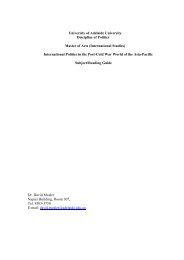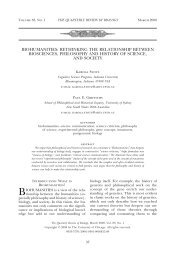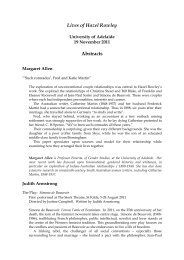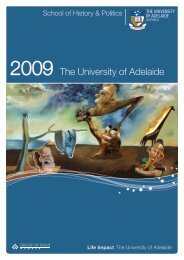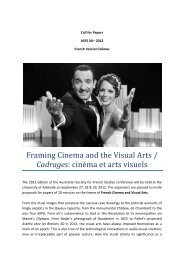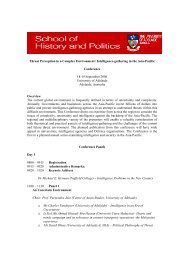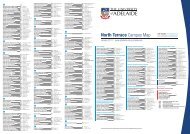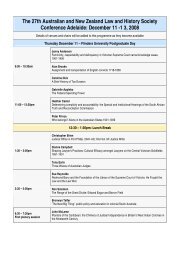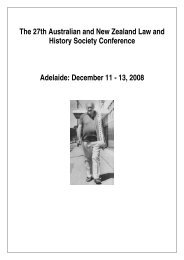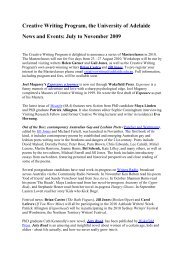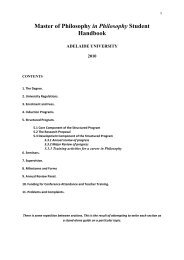Introduction - Faculty of Humanities & Social Sciences
Introduction - Faculty of Humanities & Social Sciences
Introduction - Faculty of Humanities & Social Sciences
You also want an ePaper? Increase the reach of your titles
YUMPU automatically turns print PDFs into web optimized ePapers that Google loves.
Introdu ctio n 3<br />
authors’ stated aim is for precise, ‘computer-readable’ formulations <strong>of</strong> concepts, and the<br />
relationships between them, which can be used for querying, viewing and transforming data<br />
from different disciplines for various purposes. Because an effective ontological vocabulary<br />
cannot be contrived in the absence <strong>of</strong> a theoretical framework in which it does work, Baclawski<br />
and Niu survey the “best-known ontologies” in the two main disciplines with which<br />
bioinformatics is concerned, biology and medicine.<br />
Figure 0.1<br />
<strong>Sciences</strong> concerned with cognition*<br />
PSYCHOLOGY COGNITIVE COMPUTATIONAL** ANIMAL PHYSIOLOGY<br />
1. theoretical psychology artificial<br />
intelligence<br />
behaviour<br />
(individual)<br />
2. experimental neuroscience autonomous agents behaviour<br />
(social)<br />
neuroscience<br />
neurobiology<br />
3. developmental linguistics modelling communication neuroanatomy<br />
4. social ethology architectures behavioural<br />
ecology<br />
neurolinguistics<br />
5. clinical philosophy signal processing sensory systems neuroeconomics<br />
6. psychiatry α anthropology artificial life navigation neuropsychology<br />
7. biological sociology culture neuroendocrinology<br />
8. comparative archaeology primatology<br />
9. evolutionary ergonomics<br />
10. ecological economics βφ<br />
11. parapsychology<br />
* It is assumed that the chart is incomplete and considerable overlap exists between categories. For example, ‘social<br />
cognitive neuroscience’ (Gilbert 2002) and ‘neuroethoendocrinology’ are missing, not least because they are genuinely<br />
interdisciplinary and do not fit neatly into any particular category.<br />
** φ ’Computational’ is more or less synonymous with ‘cognitive’ in the column at left. My intention is to draw a<br />
distinction between (cognitive) disciplines and problems or approaches that explicitly fall within computer science.<br />
Whether the distinction works is another matter.<br />
α Psychiatry, normally distinguished from psychology on the basis <strong>of</strong> its traditional affiliation with the practice <strong>of</strong><br />
medicine, is included here for pragmatic purposes.<br />
β<br />
Perhaps more <strong>of</strong>ten referred to as behavioural economics.<br />
Considering the number <strong>of</strong> fields encompassed by their embrace (see Figure 0.1), a similar<br />
effort in the cognitive sciences would be daunting indeed. This is so even were psychology<br />
alone considered. The experience <strong>of</strong> Kleinginna and Kleinginna (1981a; 1981b) in their surveys<br />
<strong>of</strong> how ‘emotion’ and ‘motivation’ are used in the psychological literature is instructive. A review<br />
through 1980 unearthed no fewer than 102 definitions <strong>of</strong> motivation, which they classified into<br />
nine categories based on the phenomena described or the theoretical issue involved, and 92<br />
definitions <strong>of</strong> emotion, in eleven categories. Perhaps not surprisingly, an additional category<br />
was included in both cases for sceptical arguments regarding the usefulness <strong>of</strong> the terms. By<br />
comparison, the troublesome plurality <strong>of</strong> the term ‘species’—which at a mere 22 definitions has<br />
been described as “drowning in a sea <strong>of</strong> species concepts” (Hull 1999:44)—looks not only tame<br />
but almost tractable. Kleinginna and Kleinginna tried to bring some order to this cacophony by



